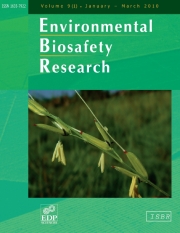Article contents
No recombination detected in artificial potyvirus mixed infections and between potyvirus derived transgenes and heterologous challenging potyviruses
Published online by Cambridge University Press: 16 November 2007
Abstract
Risk-assessment studies of virus-resistant transgenic plants (VRTPs) focussing on recombination of a plant virus with a transgenic sequence of a different virus should include a comparison of recombination frequencies between viruses in double-infected non-transgenic plants with those observed in singly infected transgenic plants to estimate recombination incidence in VRTPs. In this study, the occurrence of recombination events was investigated in non-transgenic plants double-infected with two different potyviruses, as well as in potyviral genomes in singly infected transgenic plants expressing potyvirus sequences. Different potyviruses, namely Potato virus A (PVA), Tobacco vein mottling virus (TVMV), two strains of Potato virus Y (PVY-O, PVY-H) and two strains of Plum pox virus (PPV-NAT, PPV-SK68), were used in three combinations for double infection of a common host. Furthermore, transgenic plants expressing either potyviral coat protein (CP), helicase (CI) or polymerase (NIb) coding sequences (PPV-NAT-CP, PVY-CI, PVY-NIb) were singly-infected with a heterologous potyvirus, which was not targeted by the respective transgenic resistance. To identify recombinant potyviral sequences, a sensitive RT-PCR was developed to detect up to one recombinant molecule out of 106 parental molecules. In 304 mixed infected non-transgenic plants, 92 mixed and 164 single infected transgenic plants screened for recombinant sequences no recombinant potyviral sequence was found. These results indicate that recombination events between different potyviruses in mixed infections and between a potyvirus infecting a potyvirus-resistant transgenic plant are likely to be very infrequent.
- Type
- Research Article
- Information
- Copyright
- © ISBR, EDP Sciences, 2007
References
- 9
- Cited by


